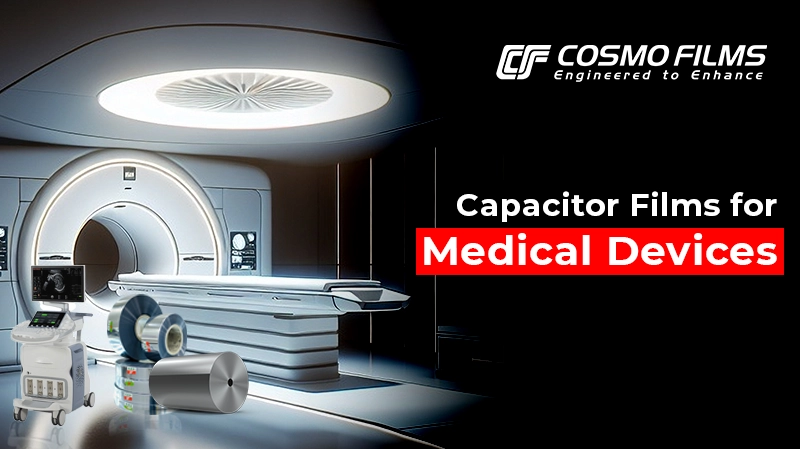Capacitor films used in medical devices play a critical role in ensuring the smooth operation of machines that range from simple diagnostic tools to life-supporting equipment. These components are crucial in maintaining medical devices' stability, accuracy, and longevity. Capacitors films are known for their superior electrical properties, including:
- Ability to withstand high voltages
- provide stability
- perform reliably over extended periods
- High reliability & long life
- Low dielectric losses
- Excellent insulation resistance
- Non-toxic, halogen-free materials
- Self-healing properties (in MPP film capacitors)
The film's ability to handle high frequencies and voltages without degradation is vital for the sensitive nature of medical equipment. Let’s read how these films help medical devices perform better.
Film Capacitors for Medical applications:
|
Application Area
|
Role of Film Capacitors
|
|
Defibrillators (AEDs & ICDs)
|
Energy storage/discharge during shock therapy
|
|
X-Ray Machines & Imaging
|
High-voltage filtering, pulse discharge
|
|
MRI & CT Scanners
|
Power factor correction, filtering, and energy storage
|
|
Ventilators & Monitors
|
Noise suppression, power stability
|
|
Infusion & Dialysis Equipment
|
Signal filtering, stable power supply
|
|
Pacemakers (external)
|
Miniaturized capacitors for circuit reliability
|
Types of Capacitor Films Used for Medical Applications
- BOPP Films: Preferred for high-voltage and low-loss applications
- MPP Films: Used for self-healing properties and compact capacitor design
Film Grades use in Medical Devices:
- Ultra-clean, pinhole-free films
- Higher dielectric strength and uniform thickness
- Temperature resistance and moisture stability
Cosmo Films Performance Advantages in Medical Devices:
|
Feature
|
Benefit in Medical Use
|
|
Self-healing
|
Prevents catastrophic failures during energy discharge
|
|
Low ESR & ESL
|
Stable pulse performance and minimal noise
|
|
Thermal stability
|
Withstands sterilization and medical-grade conditions
|
|
Precision & Consistency
|
Ensures accurate monitoring and life-saving actions
|
A. Power Management in Medical Devices
Medical devices must get a steady, uninterrupted power supply to operate efficiently. Therefore, capacitor films in these devices ensure the smooth flow of electricity.
• These films can handle high-voltage surges and provide stable power to sensitive components.
• The films act as energy storage components in devices with complex power needs, such as MRI machines or X-ray units, too.
B. Signal Filtering for Accurate Diagnosis
- Medical devices like diagnostic imaging systems require precise signal processing to deliver accurate results. Capacitor films are used in signal-filtering circuits to remove noise or unwanted frequencies from signals.
- It can be used in diagnostic equipment such as ultrasound machines, EEGs, and CT scanners.
C. Energy Storage for Medical Devices
- In devices like pacemakers, defibrillators, and hearing aids, capacitor polypropylene film is used to store energy for rapid discharge when required.
D. Long-term Stability and Durability
- In medical implant devices like pacemakers or neurostimulators, capacitor films must withstand the harsh biological environment without failing.
- The dielectric materials used in these films are chosen for their long-term stability and resistance to degradation, ensuring that the capacitors maintain their performance characteristics.
E. Miniaturization & Flexibility in Medical Devices
- As medical devices become compact and portable, there is an increasing demand for miniaturized components that fit within small form factors.
- Capacitor films play a significant role in this area, as they are available in various sizes and can be made very thin while maintaining high capacitance values.
F. Safety and Reliability in Critical Applications
- Capacitors used in medical devices must handle high temperatures, humidity, and mechanical stress without failure. Capacitor films are engineered to meet stringent safety standards, ensuring they operate reliably under extreme conditions.
- This is especially important in life-support equipment, where component failure could have serious consequences.
Capacitor polypropylene films are critical components in medical electronics. Their ability to manage power, filter signals, store energy, and provide long-term stability makes them essential for properly functioning these devices. With advancements in materials and manufacturing techniques, capacitor films will continue to enhance the performance of medical devices, driving innovation.
